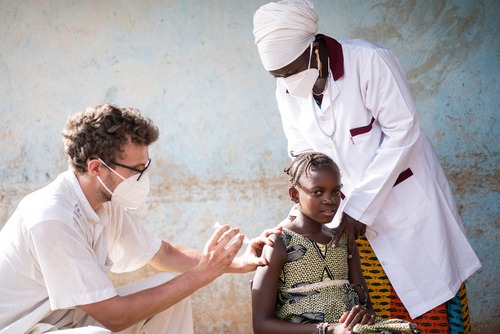
The Biden-Harris administration has reprioritized global health security at the top of America’s national security agenda in efforts to end the COVID-19 pandemic and bolster health systems worldwide by improving preparation, prevention, detection, and response to the next public health threat.
Earlier this month, the White House released the annual report, Strengthening Health Security Across the Globe: Progress and Impact of United States Government Investments in the Global Health Security Agenda, which details the nation’s progress in helping countries build health security capacity through the Global Health Security Agenda (GHSA) during fiscal year 2020.
“We are bringing a whole-of-government effort to address global health as a national security imperative, and this report describes how GHSA investments have been critical in advancing the COVID-19 response, and outlines our strategic approach for assisting countries to meet specific targets,” said National Security Adviser Jake Sullivan on Oct. 14.
Initially, the GHSA was launched as a five-year effort that began in 2014. However, due to the program’s success, along with a growing global need for the program, a subsequent five-year plan was initiated in 2018 known as GHSA 2024.
The goal of the GHSA is to strengthen the world’s ability to prevent, detect and respond to infectious disease threats. Currently, more than 70 countries, as well as international organizations, non-governmental organizations, and private-sector entities, have joined together to strengthen global health security, according to the report.
The GHSA emphasizes a whole-of-government and multisectoral effort to build national capacity to prepare for biological catastrophes, which include human and animal health, agriculture, security, defense, law enforcement, development assistance, foreign affairs, and finance, the report says.
“GHSA 2024 introduced the bold target of more than 100 countries completing a transparent evaluation of health security capacity, performing planning and resource mobilization to address their gaps, and implementing activities to improve their capacity,” Sullivan explained. “This administration is committed to supporting and strengthening GHSA in the years ahead and we will continue to use our partner country investments and technical expertise to help achieve the GHSA target.”
The report focuses on activities implemented during the sixth year (FY 2020) of the U.S. commitment to advance global health security in its 19 GHSA partner countries, which received intensive financial and technical assistance to help achieve GHSA 2024 targets by designing and implementing programs that address globally identified capacity gaps.
In FY 2020, the U.S. government provided more than $480 million in GHSA funding to advance this work in partner countries, building upon the health security capacity gains in partner countries from previous U.S. investments of more than $2 billion since 2015 aimed at better assisting them to rapidly detect and effectively respond to infectious disease outbreaks — including COVID-19 and Ebola — and preventing them, according to the report.
Also in FY 2020, GHSA programs pivoted to support partner country COVID-19 response activities, including contact tracing, community engagement and coordination of public health response efforts.
An example of U.S. government support for GHSA activities include those in Pakistan, which designed and launched a COVID-19 Travelers Surveillance Management Information System at 19 air, sea and land points-of-entry; trained 130 government staff on the tool; and screened more than a million passengers, according to the report.
Another example is Liberia, also one of the U.S. 19 partner countries, which revitalized its community event-based prevention surveillance system in three counties to improve the ability of its public health systems to combat deadly zoonotic diseases.
And as an example of U.S. investments in the area of emergency preparedness, Mali conducted training on cholera prevention and established oral rehydration points in high-risk communities, the report says, noting that the trainings culminated in simulations to test roles, responsibilities and coordination mechanisms in the event of a suspected cholera outbreak.
To continue this work and other activities, Congress appropriated more than $610 million to be directed in FY 2021 toward numerous capacity-building in the U.S. partner countries, according to the report.
“It will take bold, decisive, equitable, and innovative policy to defeat COVID-19 and build a safer and more secure world,” the report says. “Strong and sustained U.S. government leadership in GHSA remains essential. Emerging and reemerging infectious diseases are an imminent threat to global and national security that neither the United States nor the world can afford to ignore.”
Sullivan agreed, saying that improving the capabilities of individual countries and the United States’ shared capacity to take on infectious disease threats has never been more important.
“The United States will continue to work expeditiously to end this pandemic, including by continuing to donate vaccine doses and drive efforts to vaccinate the world, and rally the world to build back better to prevent the next pandemic,” he said. “It’s going to take ambitious actions to ensure sustained global financing and political leadership, but we can do it. We can invest in saving lives now and creating a more secure and healthy future. The GHSA is a vital part of that work.”




